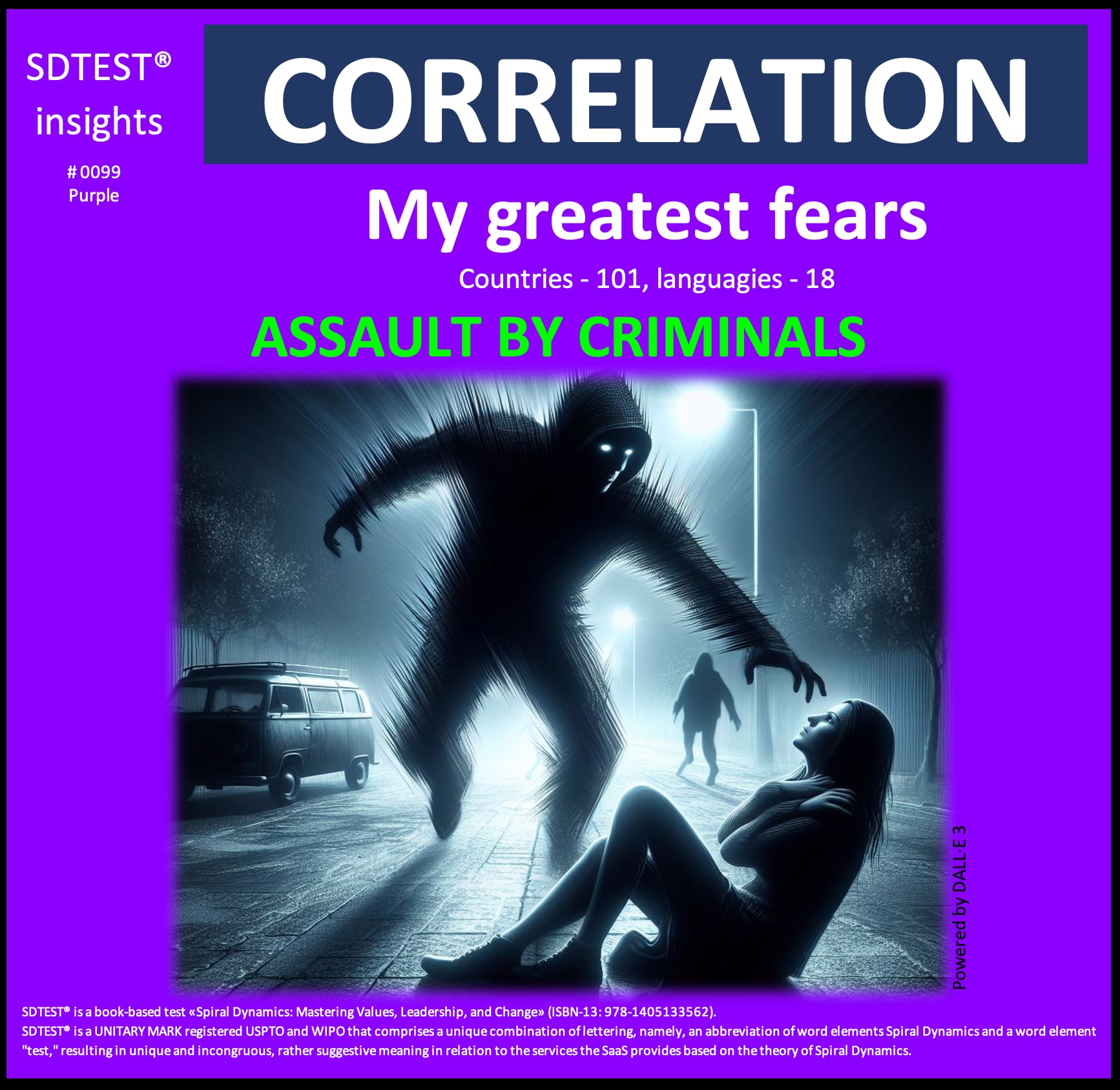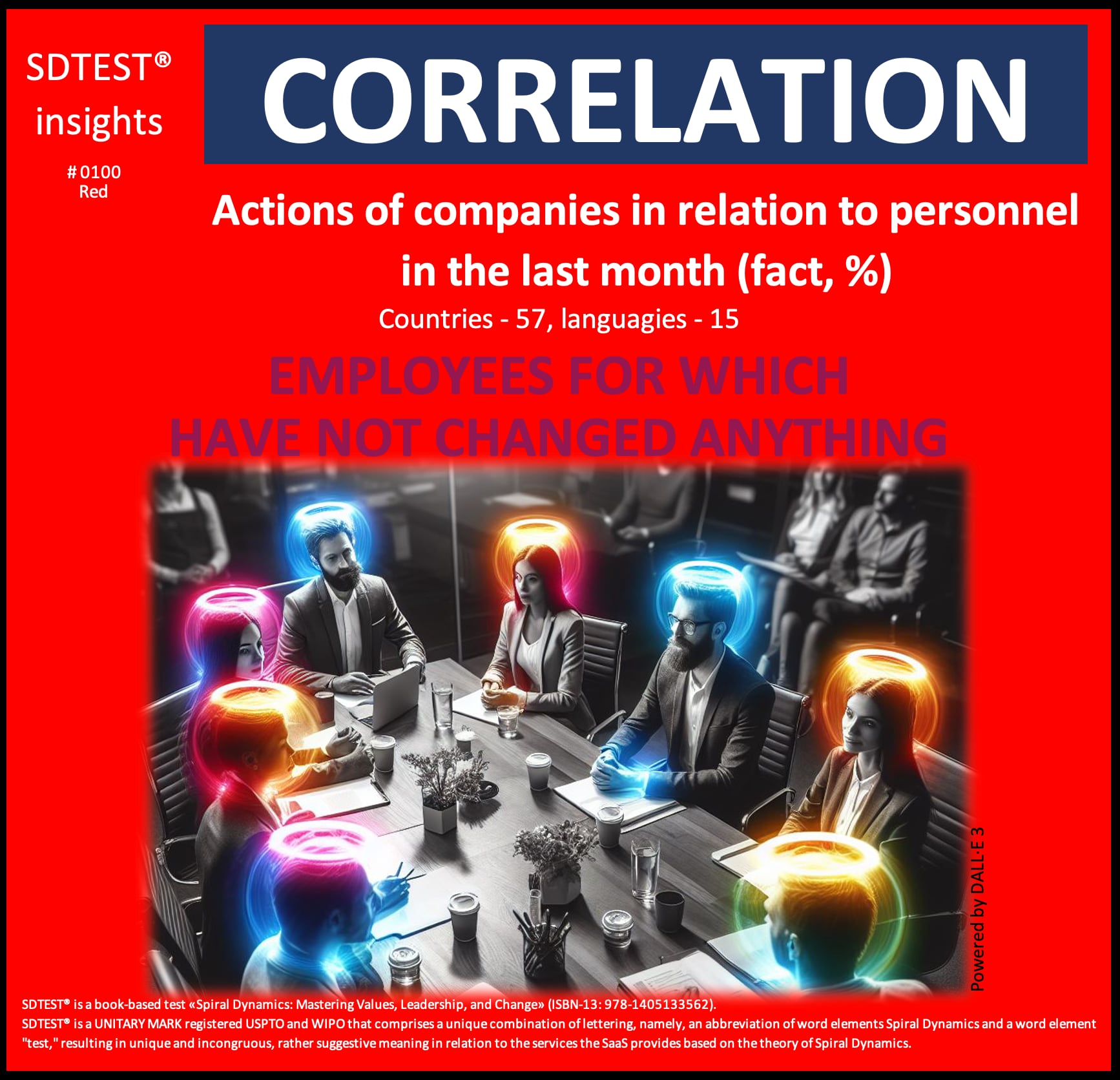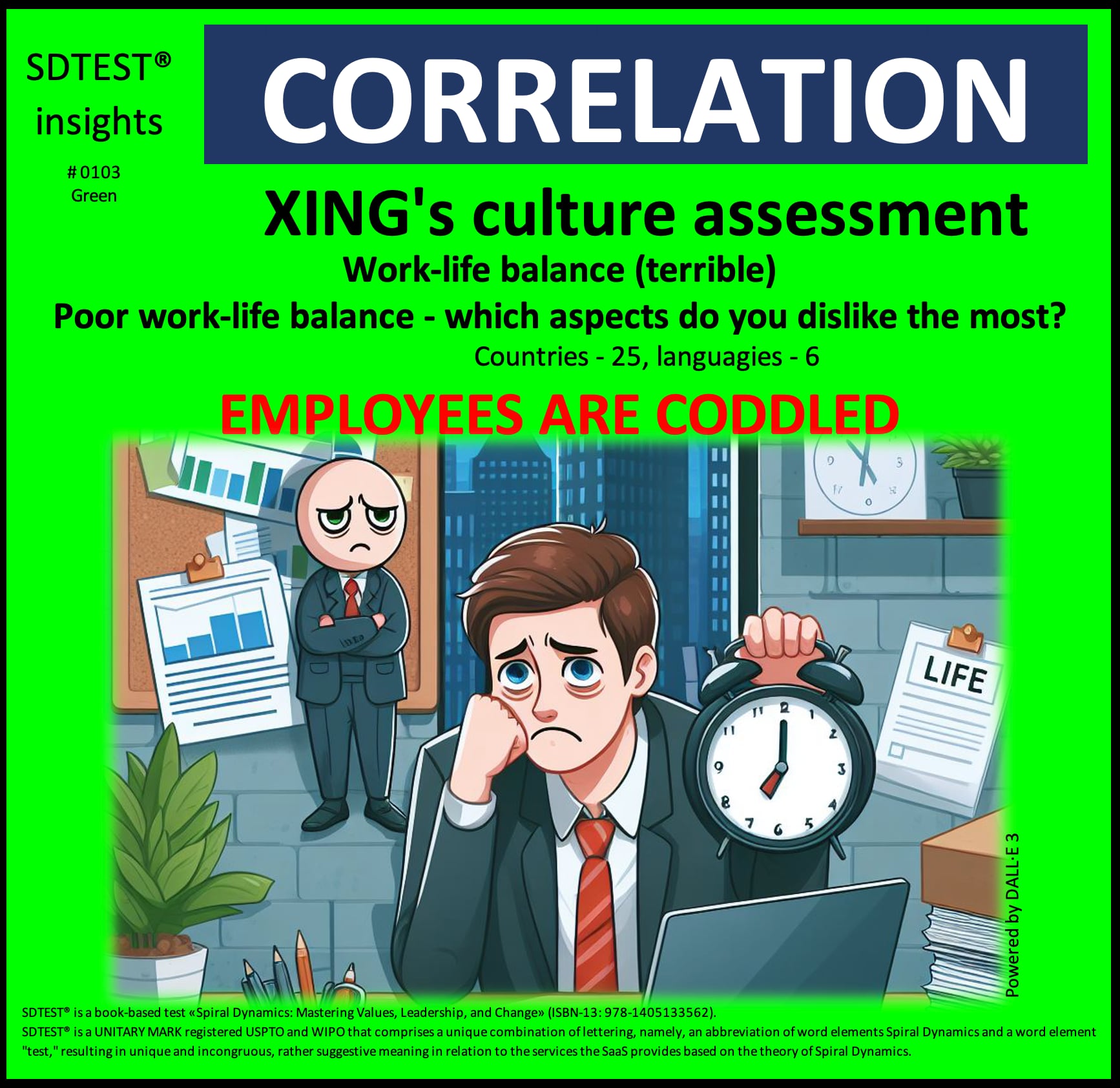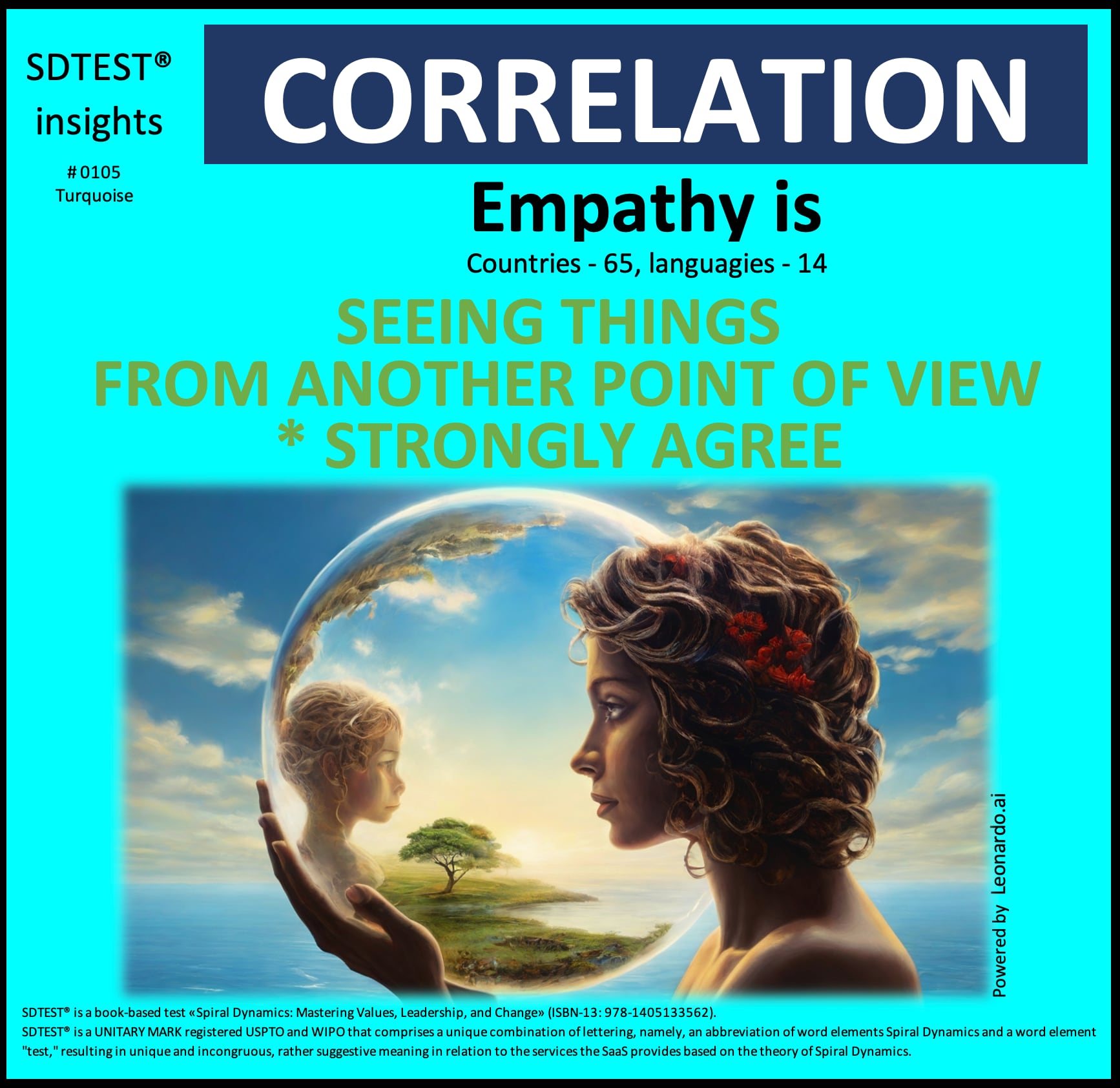Dynamics: Mastering Values, Leadership,
and Change» (ISBN-13: 978-1405133562)

SDTEST® has 33 different VUCA polls that calculate the 12,299 correlation values between stages of development according to the theory of Spiral Dynamics and answer options of these 33 polls.
We invite curiosity about the systemic mechanisms behind this correlation. There may be hidden variables that provide alternative explanations.
0.0756 between the Assault by criminals and the Purple stage.
The critical value of the correlation coefficient for a normal distribution, by William Sealy Gosset (Student) r = 0.0359. This positive correlation of 0.0756 meets the reliability criteria but does not necessarily imply causation.

This positive correlation of 0.0756 suggests a relationship between the fear of assault by criminals and individuals operating within the Purple stage of value system development. Specifically, those aligned with the Purple worldview tend to exhibit a higher association with expressing fear related to criminal assault.
From the lens of the Purple value system, this correlation reflects a deeply rooted sense of tradition and community and the importance of maintaining established norms and rituals. In traditional agricultural societies associated with the Purple stage, the sanctity of the community and the preservation of customs and beliefs are of the utmost importance.
It is important to note that this positive correlation does not necessarily imply an irrational or excessive fear within the Purple value system. Instead, it may reflect a deep-rooted cultural and societal context in which the preservation of community, adherence to traditions, and maintaining order are highly valued.
The fear of assault by criminals may stem from a perception that such acts not only threaten individual safety but also disrupt the harmony and cohesion of the community as a whole. Within the Purple worldview, criminal behavior could be seen as a violation of the sacred traditions, rituals, and taboos that govern the collective.
-0.91 between the Employees for which have not changed anything and the Red stage.
The critical value of the correlation coefficient for a normal distribution, by William Sealy Gosset (Student) r = 0.0902. This negative correlation of -0.91 meets the reliability criteria but does not necessarily imply causation.

This negative correlation of -0.91 suggests an inverse relationship between companies that have not changed anything in their personnel and the Red stage. From the lens of the Red value system, this negative correlation could be interpreted as a reflection of the desire for constant change and disruption and the pursuit of personal gain or advantage.
The Red value system is characterized by disregarding rules, laws, or established norms. Individuals operating within this value system may view a company's decision to maintain the status quo regarding personnel as a sign of complacency or a failure to adapt to changing circumstances, which could threaten their ambitions or desire for growth.
However, it is essential to note that this negative correlation does not necessarily imply a complete rejection of stability or a lack of appreciation for consistency within the Red value system. Instead, it may reflect a more acute sensitivity to perceived opportunities for personal gain or the pursuit of self-interest, which could hinder a lack of change or disruption in the organizational landscape.
-0.0903 between the Exhaustion: Feeling physically or mentally drained makes initiating or completing tasks challenging. / Highly Applicable, and the Blue stage.
The critical value of the correlation coefficient for a normal distribution, by William Sealy Gosset (Student) r = 0.0793. This negative correlation of -0.0903 meets the reliability criteria but does not necessarily imply causation.

This negative correlation of -0.0903 suggests an inverse relationship between feeling physically or mentally drained (exhaustion) as a reason for procrastination and the Blue stage. Individuals operating within the Blue value system tend to exhibit a lower association with attributing their procrastination to exhaustion or feeling drained.
From the lens of the Blue value system, this negative correlation could be interpreted as a reflection of the strong sense of duty, discipline, and the belief in following established rules and hierarchies.
Those in the Blue stage may perceive exhaustion or feeling drained as a less acceptable justification for procrastination, as it could be seen as a violation of their moral code or a failure to uphold their responsibilities. The Blue value system emphasizes fulfilling one's obligations, regardless of personal circumstances or temporary setbacks.
Additionally, the Blue worldview values order, structure, and adherence to authority. Individuals operating within this value system may be more inclined to push through feelings of exhaustion or mental fatigue, driven by a sense of duty and the belief that rules and expectations must be met, even in challenging circumstances.
However, it is essential to note that this negative correlation does not necessarily imply a complete disregard for personal well-being or a lack of compassion within the Blue value system. Instead, it may reflect a prioritization of duty and adherence to moral codes over personal factors stemming from a belief in maintaining order and following established traditions and hierarchies.
-0.0946 between the Feel they have something to lose and the Orange stage.
The critical value of the correlation coefficient for a normal distribution, by William Sealy Gosset (Student) r = 0.0592. This negative correlation of -0.0946 meets the reliability criteria but does not necessarily imply causation.

This negative correlation of -0.0946 suggests an inverse relationship between the feeling of having something to lose as a reason for giving up and the Orange stage. Individuals operating within the Orange value system tend to exhibit a lower association with attributing their tendency to give up to a fear of losing something.
From the Orange value system's lens, this negative correlation reflects the focus on achieving goals and objectives through logical reasoning and the application of scientific methods.
Those in the Orange stage may be more inclined to approach challenges and obstacles from a rational and analytical perspective rather than being deterred by the potential for loss or setbacks. The Orange worldview values progress, efficiency, and results, often prioritizing forward momentum and pursuing knowledge over concerns about potential risks or sacrifices.
The Orange value system emphasizes individualism, self-reliance, and a competitive spirit. Individuals operating within this value system may be less likely to perceive the possibility of loss as a significant deterrent, as they tend to strongly believe in their ability to overcome challenges through their efforts and the application of rational problem-solving techniques.
However, it is essential to note that this negative correlation does not necessarily imply a complete disregard for potential risks or consequences within the Orange value system. Instead, it may reflect a tendency to approach decision-making and goal-setting more objectively and analytically, weighing the potential benefits against the costs or losses logically and systematically.
In addressing the issue of perseverance and overcoming the tendency to give up, it may be beneficial to integrate elements of the Orange value system, such as promoting critical thinking, encouraging data-driven decision-making, and fostering a culture of continuous learning and adaptation. At the same time, it is essential to balance these elements with an understanding of the emotional and psychological factors that can influence human behavior, ensuring a well-rounded approach to achieving personal and professional goals.
-0.2934 between the Employees are coddled and the Green stage.
The critical value of the correlation coefficient for a normal distribution, by William Sealy Gosset (Student) r = 0.1917. This negative correlation of -0.2934 meets the reliability criteria but does not necessarily imply causation.

This negative correlation of -0.2934 suggests an inverse relationship between the perception that employees are coddled as an aspect of poor work-life balance and the Green stage. Individuals operating within the Green value system tend to associate less with this view of work-life balance.
From the lens of the Green value system, this negative correlation reflects the concern for the well-being of all individuals and the recognition of the interconnectedness of various aspects of life.
Those in the Green stage may be less inclined to perceive measures to promote a healthy work-life balance as coddling employees. Instead, they may view such efforts as essential for fostering a holistic and sustainable approach to individual and organizational well-being, recognizing the interdependence between personal fulfillment and professional productivity.
The Green worldview values cooperation, unity, and the harmonious integration of different spheres of life. Individuals operating within this value system may perceive an imbalance between work and personal life as detrimental to the overall well-being of individuals, communities, and the broader ecosystem.
Furthermore, the Green value system emphasizes systems thinking and recognizing the complex interplay between various factors. From this perspective, the negative correlation could stem from an understanding that a lack of work-life balance can have far-reaching consequences for individuals and the broader social and environmental contexts in which they operate.
However, it is essential to note that this negative correlation does not necessarily imply a dismissal of concerns about workplace productivity or a lack of commitment to professional goals. Instead, it may reflect a holistic approach to balancing various aspects of life, recognizing that individual well-being and organizational success are interdependent and mutually reinforcing.
-0.1384 between the International Market leader and the Yellow stage.
The critical value of the correlation coefficient for a normal distribution, by William Sealy Gosset (Student) r = 0.0609. This negative correlation of -0.1384 meets the reliability criteria but does not necessarily imply causation.

This negative correlation -0.1384 suggests an inverse relationship between the desire to pursue an opportunity as an international market leader and the Yellow stage. Individuals operating within the Yellow value system tend to associate less with this particular career aspiration.
From the lens of the Yellow value system, this negative correlation reflects a more nuanced and holistic approach to personal growth and career development, transcending traditional notions of success and leadership.
Those in the Yellow stage may be less inclined to view the role of an international market leader as the pinnacle of career accomplishment or personal fulfillment. Instead, they may perceive such a role as one potential path among many, recognizing the complexity and interconnectedness of various factors contributing to personal growth and societal impact.
The Yellow worldview values the integration of multiple perspectives and a deep understanding of complex systems. Individuals operating within this value system may perceive the role of an international market leader as too narrowly focused or needing a more holistic approach to address the intricate challenges and interconnections within global markets and societies.
Furthermore, the Yellow value system emphasizes personal growth and development beyond traditional measures of success. From this perspective, the negative correlation could stem from recognizing that personal fulfillment and societal impact may not necessarily be achieved through pursuing a singular, high-profile leadership role but rather through a more integrative and multifaceted approach to personal and professional development.
However, it is essential to note that this negative correlation does not necessarily imply a lack of ambition or a disregard for leadership opportunities within the Yellow value system. Instead, it may reflect a more nuanced and holistic approach to career aspirations, recognizing the inherent complexities and interconnections within global systems and prioritizing personal growth and societal impact over traditional notions of success and leadership.
0.1356 between the Seeing things from another point of view / Strongly Agree and the Turquoise stage.
The critical value of the correlation coefficient for a normal distribution, by William Sealy Gosset (Student) r = 0.0813. This positive correlation of 0.1356 meets the reliability criteria but does not necessarily imply causation.

This positive correlation of 0.1356 suggests a relationship between strongly agreeing that empathy involves seeing things from another's point of view and individuals operating within the Turquoise stage of value system development. Those aligned with the Turquoise worldview tend to associate more with this understanding of empathy.
From the Turquoise value system's lens, this correlation reflects the emphasis on holistic thinking, recognizing diverse perspectives, and fostering a deep sense of interconnectedness and compassion for all beings.
The Turquoise worldview values the ability to transcend narrow viewpoints and embrace multiple perspectives, recognizing the inherent complexity and interdependence of human experiences and natural systems. The capacity to see things from another's point of view is a fundamental aspect of this holistic and integrative approach, enabling individuals to cultivate a deeper understanding and appreciation for the diverse tapestry of life.
Furthermore, the Turquoise value system is characterized by a strong sense of empathy and a deep concern for the well-being of both people and the planet. The ability to empathize and consider alternative perspectives is essential for fostering meaningful connections, promoting inclusivity, and developing sustainable solutions that account for the interconnected nature of human and environmental challenges.
It is important to note that this positive correlation does not necessarily imply a lack of self-awareness or a complete abandonment of personal perspectives within the Turquoise value system. Instead, it reflects a conscious effort to expand one's understanding and embrace the richness of diverse experiences, recognizing that genuine empathy and holistic solutions require the integration of multiple viewpoints.
What insights do you gain from today's correlation? How might we study this relationship more carefully before deducing causation?
We welcome respectful and wise perspectives! Stay tuned every week as we share more results and insights.
After login or registration, free access to the poll results in the FAQ section.
